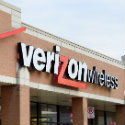Verizon's Vestberg sticks to the 5G script
Verizon CEO Hans Vestberg declined to directly discuss the company's rivals like AT&T and Dish Network. But he was clear on monetizing 5G: 'We're already doing it,' he said.

As Hans Vestberg settles into his role as CEO of Verizon, he appears determined to keep his eyes on 5G.
"We let others talk," he said Tuesday at an investor conference. "We execute."
Amid questioning on 5G, content, dividend payments and rivals, Vestberg generally refused to call out Verizon's competitors (as T-Mobile executives are fond of doing) or to offer a sense of regret over possible missteps (as AT&T's executives have recently expressed).
Instead, Vestberg said that Verizon largely remains on the path he laid out after taking control of the operator in 2018. That path involves a pivot away from the content industry pursued by his predecessor, Lowell McAdam, and a focus on networking technologies including fiber and 5G. In terms of services and strategies, Vestberg remains optimistic about the overall 5G opportunity as well as specific services like fixed wireless access, private wireless networks and edge computing.
And Vestberg made only passing references to Verizon's competitors, including AT&T and Dish Network.
"We're going to grow both the top line and the bottom line," he said in response to questions about how Verizon might continue to offer shareholder dividends. He said that approach "might be very different from others," which is likely a veiled reference to AT&T. That carrier recently said it will pair down its own dividend as it works to exit the content industry via the combination of its WarnerMedia business with Discovery.
But Vestberg refused to discuss his views on Dish Network's new agreement with Amazon Web Services, and how it might differ from Verizon's own work with AWS. "I will not tell you," he said in response to questions on the topic, noting only that Verizon's deal with AWS is "very different" than Dish's deal.
FWA, edge computing and more
The one topic that Vestberg expounded on in detail was 5G – specifically, how Verizon hopes to profit from the technology.
"Sometimes people ask, 'When are you going to monetize 5G?' " Vestberg said. "We're already doing it."
He pointed to Verizon's strategy of positioning its speedy 5G – dubbed Ultra Wideband – as available only in Verizon's more expensive unlimited plans. That's one of several carrots – others include a subscription to Disney+ or Apple Arcade – that Verizon is using to entice its customers to upgrade from metered data plans to increasingly expensive unlimited data plans. The company's goal is to get 50% of its customers to subscribe to its pricey "premium unlimited" plans by 2023, up from 21% today.
Other 5G revenue opportunities are further out, Vestberg explained. He said the company remains positive on the fixed wireless access (FWA) opportunity – Verizon eventually plans to cover up to 50 million households with the technology by 2025, generating "well over" $1 billion in revenues by that time. Vestberg said FWA would begin to be a "more important piece of our growth" starting next year.
And through next year and beyond, Vestberg said Verizon expects to make money from the sale of mobile edge computing and private wireless networking via partners Amazon and Microsoft. Vestberg specifically mentioned potential customers in locations such as stadiums, manufacturing facilities, big logistics centers and hospitals and other healthcare locations as prime candidates for edge computing and private wireless networking. "All of them are coming," he said.
As for Verizon's customer growth, Vestberg said the operator will continue to chase profitable customers through its own brand as well as through partner brands such as Xfinity Mobile and Spectrum Mobile. Those are the mobile offerings from Comcast and Charter, respectively, that run over Verizon's network. Vestberg also mentioned other brands such as Verizon's Visible prepaid offering and TracFone, which he expects Verizon to finish acquiring by the end of the third quarter.
Finally, Vestberg addressed a question about government funding for broadband – a noteworthy topic considering Democrats and Republicans appear to be finding some common ground around the need to fund broadband across the US. Interestingly, Vestberg suggested Verizon wasn't very interested in government funding for broadband in rural areas, but argued that the government should consider providing subsidies to help low-income Americans pay for broadband in urban areas where it's already available. "Where I want focus, that's around affordability," he said.
Thus, it appears Verizon isn't prepared to make investments into delivering fiber into rural areas as rivals like Charter are pursuing.
Related posts:
— Mike Dano, Editorial Director, 5G & Mobile Strategies, Light Reading | @mikeddano
About the Author(s)
You May Also Like












